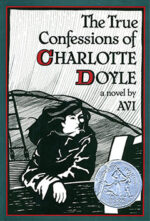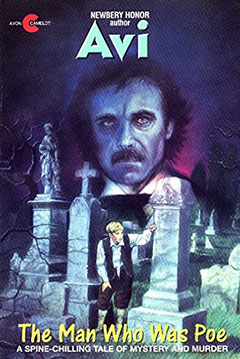This was first published in December of 2015, celebrating the book’s anniversary. I’m sure that Team Charlotte hoisted this article to #8 on the countdown of Most Read Blog Posts.
 The other day I was startled to realize that my book, The True Confessions of Charlotte Doyle was published twenty-five years ago.
The other day I was startled to realize that my book, The True Confessions of Charlotte Doyle was published twenty-five years ago.
Here’s the story behind the book.
I had been working on another novel; The Man Who was Poe, when I first had the idea for the book. The Man Who was Poe, (which is about Edgar Allan Poe) takes place in Providence, Rhode Island, where I was living at the time. Poe is often credited with the invention of the mystery story, in particular with his Murder on the Rue Morgue. So it was quite natural that I was thinking of mysteries, and in particular of the idea of the so-called “locked room mystery,” in which something inexplicable happens in a locked room.
What, I came to think, could be more like a locked room, than a ship at sea?
 In Chapter Fourteen, on page 129 (124 in the paperback edition) of The Man Who was Poe, a character, Captain Elias, is talking to Edmund, the boy protagonist of the book. He says, “Now, Master Edmund, if you’ve got time to hear a good yarn, I’ve one for you. You see, The Lady Liberty had a sister ship. Seahawk, her name was—“
In Chapter Fourteen, on page 129 (124 in the paperback edition) of The Man Who was Poe, a character, Captain Elias, is talking to Edmund, the boy protagonist of the book. He says, “Now, Master Edmund, if you’ve got time to hear a good yarn, I’ve one for you. You see, The Lady Liberty had a sister ship. Seahawk, her name was—“
The Seahawk is the name of the ship on which Charlotte travels. Indeed, The Seahawk was the working title of the book. But as I wrote that line, it was the moment I started thinking about The Tue Confessions of Charlotte Doyle. It was to be a murder mystery set on a ship in the mid-Atlantic. I sold the idea to my editor, Richard Jackson.
However, though I began to write the book, I went to Italy (Venice) for a nine month period. As wonderful as my trip was, I found it very difficult to write there. Surrounded as I was by the Italian language, my own English writing became rather inhibited and clumsy. Besides, though I had a portable computer I did not have a printer. To print what I was writing—an important part of my writing process—I was required to go to the University but once a week and leave a computer disk (remember those?) and return five days later to pick up the printed pages. Finding it impossible to write, I stopped. The book was put on hold.
Only when I returned to Providence did I commence writing again. By then the book—in my mind—had evolved. As I wrote the form of the book—a mystery—was partly retained, but my interest (and writing) was about the evolution of Charlotte as a character.
I recall thinking of the title, but was sure it had been used in some form many times. I checked, and was surprised that it had not.
I completed the book. It went through the normal editorial and publication process. By the time book was released from my thoughts, I had found another story that held my attention: A very different book titled, Nothing but the Truth.
Charlotte went on to win the Horn Book-Boston Globe Award and a Newbery Honor plus many other awards.
The True Confessions of Charlotte Doyle will never have a sequel. But the Seahawk, which is first mentioned in The Man Who was Poe, does reappear in the first part of Beyond the Western Sea (since re-titled Escape from Home)
The book has gone through many editions, and has been translated into many languages. Curiously, over the years, it has come to be read by younger readers than was originally the case. A number of people have told me it changed their lives. It has had many, many readers.
I should read it again.
2 thoughts on “MRBP #8: Celebrating Charlotte Doyle”
Charlotte’s pluck is admirable. No wonder she resonates with so many readers…of so many different ages. Thanks for providing the back story. Your stay in Italy must have provided much thinking time instead of writing time. Quite valuable!
When I first read this book all those years ago I was completely taken with Charlotte’s metamorphosis from being dependent and a follower of rules to an independent thinker who tasted freedom and liked it. My classes always talk about how characters like Charlotte encourage them to take more risks and stand up on their own two feet. I am proud to say that I have an autographed copy of the book and have enjoyed over the years my several meetings with you.